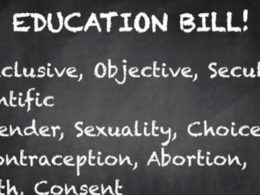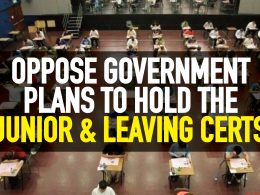By Councillor Ruth Coppinger
THE HORRORS of the Ryan Report have put on the agenda like never before the need for removal of religious control of education. Government whip, Pat Carey TD, said the state may now “take on its responsibilities for delivering an educational system” – an amazing statement for a minister to have to make in a developed country.
Why is it that the Catholic Church still controls 92% of our primary schools, with other religions managing another 6%? Is it, as is continually argued, because the Catholic church stepped in to provide services the state wouldn’t? No. In fact, since the setting up of the national school system in 1831 the church repeatedly fought state involvement in education.
The 1831 Act specifically proposed non-denominational education “to unite in one system children of different creeds” with “separate religious instruction”. However, the churches quickly moved to ensure exclusive control. In 1862, 54% of schools were still religiously mixed – a phenomenon described by Cardinal Cullen as “very dangerous… because its aim is to introduce a mingling of Protestants and Catholics”.
Parents were told to remove their sons from “the lion’s den” of national schools. The Christian Brothers would tend to “sons of the better class of the Roman Catholic population”, rather than the poor. Sexual repression, discipline, bodily shame, guilt and modesty were instilled into children – a useful social mechanism when late marriage, celibacy and emigration were key features of Irish life.
In the 1930s the more child-centred educational theories of Dewey, Montessori and others were condemned by the church “wherein… the child is supposed to be his own end”. Instead, the punitive approach of original sin and evil prevailed.
The state today pays teachers salaries but primary schools have to raise running costs. This is due once again to church interference. In the 1950s the INTO campaigned for government to pay school heating and cleaning costs. The church blocked the injection of public funds fearing the state would want more say. The Bishop of Clogher ranted that “civil servants from Dublin might come down and take control of the primary schools”. This is precisely the time when religious orders were running the gulag institutions.
Recently, the Archbishop of Dublin instructed all schools under his patronage to adopt a new discriminatory policy whereby baptismal certificates would have to be produced to gain admission due to lack of school places.
It is quite incredible that the orders named in the Ryan Report for inflicting systemic child abuse still control around 1,000 primary schools. The time is well past for a state run secular education system in Ireland. Socialists respect freedom of worship, but why should schools be the place where religious faith is passed on? Religious instruction should be provided by those who want it after school hours. Democratic boards of management should manage schools on a secular basis, with full state funding, providing a child-centred education where enquiry, initiative, tolerance, respect and creativity characterise the school curriculum.












